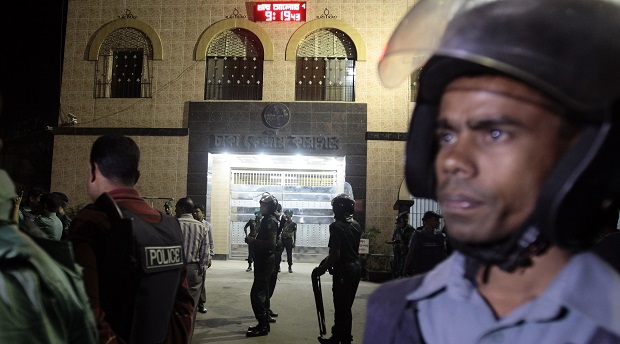
Bangladeshi security personnel stand guard outside Central Jail, where Abdul Quader Mollah, leader of the country’s largest Islamic party Jamaat-e-Islami, is being held in Dhaka, Bangladesh, Tuesday, Dec. 10, 2013. AP
DHAKA, Bangladesh—The appeals division of the Bangladesh Supreme Court is reviewing the death sentence for one of the country’s opposition leaders after a judge halted his execution at the last minute so his attorneys could seek a new review of the case.
The execution of Abdul Quader Mollah, convicted of war crimes, had been scheduled for the early hours Wednesday (Bangladesh time), but lawyers went to the home of judge Syed Mahmud Hossain and sought a postponement, defense lawyer Sazzad Ali Chowdhury said.
“We have got that order,” Chowdhury said.
Chowdhury said the postponement gave them time to file a petition which the Supreme Court’s Appellate Division was reviewing Wednesday.
The execution would be the first in special trials begun by Prime Minister Sheikh Hasina in 2010 of suspects accused of crimes during the nation’s war of independence against Pakistan in 1971. The government says Pakistani soldiers, aided by local collaborators, killed three million people and raped 200,000 women during the nine-month war.
Mollah’s party, the Jamaat-e-Islami party, issued a statement warning of “dire consequences” if he was executed.
Carrying out the execution could further complicate an already critical political situation in Bangladesh, where there have been violent protests by the opposition for weeks to demand a non-party caretaker government to oversee next election.
The government has rejected that demand and said a political government headed by Hasina would conduct the election.
The government has set the election for January 5, but an opposition alliance led by opposition leader Khaleda Zia plans to boycott it. Weeks of blockades and general strikes have left nearly 100 people dead since October. Mollah’s party has been banned by the Election Commission from taking part in election.
Deadly clashes have followed court verdicts against six other current and former officials of the Islamic party, an ally of the main opposition Bangladesh Nationalist Party, and extra police were stationed in the capital to head off any violence. Paramilitary guards were on standby across the country.
Mollah’s party and the Bangladesh Nationalist Party of Zia say the trials are politically motivated in an attempt to weaken the opposition. International human rights groups have raised questions about the impartiality of the tribunal. Authorities have denied the allegations.
Mollah was found guilty by the special tribunal in February and sentenced to life in prison. The Supreme Court then changed the penalty to a death sentence in September, triggering deadly clashes and a nationwide general strike.
Junior Law Minister Quamrul islam said prison authorities read the death warrant to Mollah on Tuesday afternoon and asked him if he wished to seek presidential clemency but he declined.
RELATED STORY:
Deadly violence after Bangladesh opposition rejects elections